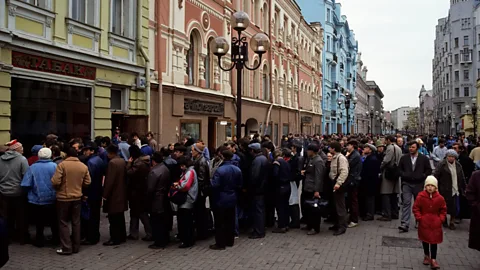Where you'll queue for nine hours just to sign a form
 Alamy
AlamyWhen Tremayne Elson arrived at the Moscow tax office, it was 5:00 in the morning and already impossible to count the number of people queuing ahead of him, waiting in a line that stretched for blocks. It would be a long wait.
That was back in October 2009, when Elson was working for an executive recruitment firm in Russia, busy building up an office that now has 140 employees. He was there to submit a new form that the Russian government required every business to fill out.
Any foreigner who has worked in Russia has heard about corruption and the bribes paid to skip a queue. And it might have been tempting to look for a shortcut.
But Elson said his company, like most foreign corporations, strongly forbid it, for good reason. Not only is paying a bribe illegal in Russia the penalties are harsh. According to law firm, Freshfields, Russia’s lower house, or State Duma, is currently considering new criminal and anti-bribery laws that will specifically target companies. The changes could bring fines of up to 30m roubles ($500,000), based on a percentage of the criminal revenue, and the revocation of business licenses or prohibition of commercial activities.
 Artist: Igor Pilishenko; Fine Art Images/Heritage Images/Getty Images
Artist: Igor Pilishenko; Fine Art Images/Heritage Images/Getty ImagesSo Elson waited in the cold for six hours. He made it to the front door of the tax office by 11:00, where there was a second queue. Another three hours later, he had made it up to the front.
“All I did was go to the counter, produce my passport and a couple other documents and sign the form,” he recalled. “Literally, in 20 seconds, I was done and left.”
Elson's experience isn’t rare. Doing business in Russia means embracing a complex system of red tape and bureaucracy. For foreign managers going to work there, it means being ready for many frustrations, from the government bureaucracy, from fellow employees, and many other challenges.
Embrace the red tape
First, you should know that government regulations are inescapable. Don’t go into a new management position in Russia thinking you’ll quickly streamline the system with Western ideas, said Eugenia “Zhenya” Kuyda, a native of Moscow, who is co-founder and CEO of San Francisco-based Luka, a personal assistant messenger app.
 Alamy
AlamyThe reason is that the government requires a document for any personnel decision, including day-off requests, corporate travel and promotions, Kuyda said. There’s no telling when you’ll get an audit from the Federal Tax Service, so your record-keeping must be spotless. And every form must have a specific company stamp that makes it all official. “You basically have to have a paper for every single thing you do,” Kuyda said.
Companies will also often have their own bureaucratic systems, even for routine business activities. So foreign managers must figure out which procedures are necessary and which aren't, Kuyda said.
Bridging the gap
The secret to mastering the piles of paperwork is fairly simple, said Dmitry Grishin, an investor and internet entrepreneur from Moscow. Have a local in the office who can become your No. 2. “Find someone you can trust,” Grishin said. “Someone with a Western education who returned home. They should understand what you want to accomplish.”
It also makes sense, Grishin said, to have a Russian accountant on staff, and probably a lawyer on retainer too. It’s not just that they’ll know which form needs to be filled out and which ones can be skipped, it’s that they will help clearly relay your orders to the staff.
Thing is, Russians do not take kindly to Westerners coming in with big ideas on how things can be done better, Grishin said, even if it means streamlining procedures. So having local staff communicate messages can help. The locals on staff can also help navigate dealing with the government – for example, by applying for local government contracts.
 Pete Turner/GettyImages
Pete Turner/GettyImagesThere have been some efforts in Russia to curb corruption. Laws that came into effect in 2011 resulted in 8,000 convictions in the first nine months of 2015 and another 11,000 people receiving reprimands at work, according to the Kremlin. Transparency International’s report on worldwide corruption says things have gotten only slightly better in Russia – it ranked 119th on last year’s Corruption Perception Index, behind Guyana and Azerbaijan.
Most multinational companies hire intermediaries to get things done, from visas for their foreign workers to documents needed to open a new office space.
Elson is now managing director of the Association of Professional Staffing Companies in Frankfurt, Germany, but he still makes frequent trips to Russia. He said once you’ve grappled with the bureaucracy, doing business in Russia is just like anywhere else. And generally he’s found it a country where locals are glad to see foreign investment.
But, Elson said, just be ready to accept the myriad of rules. “Because,” he said, “it applies to literally every level of what you’ll do.”
